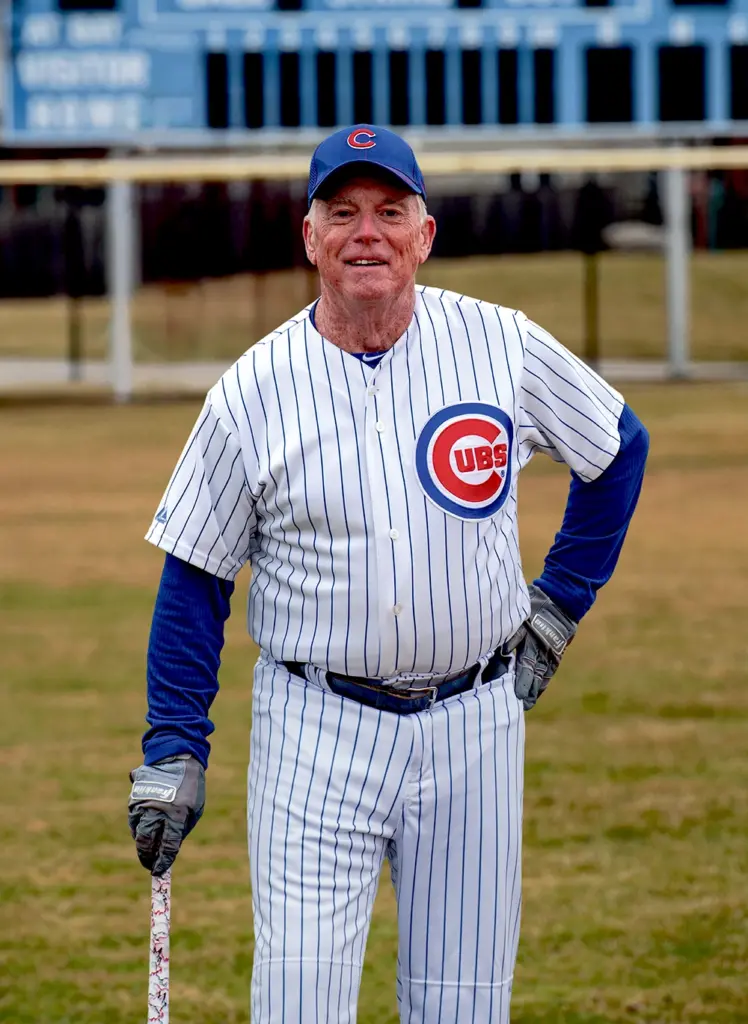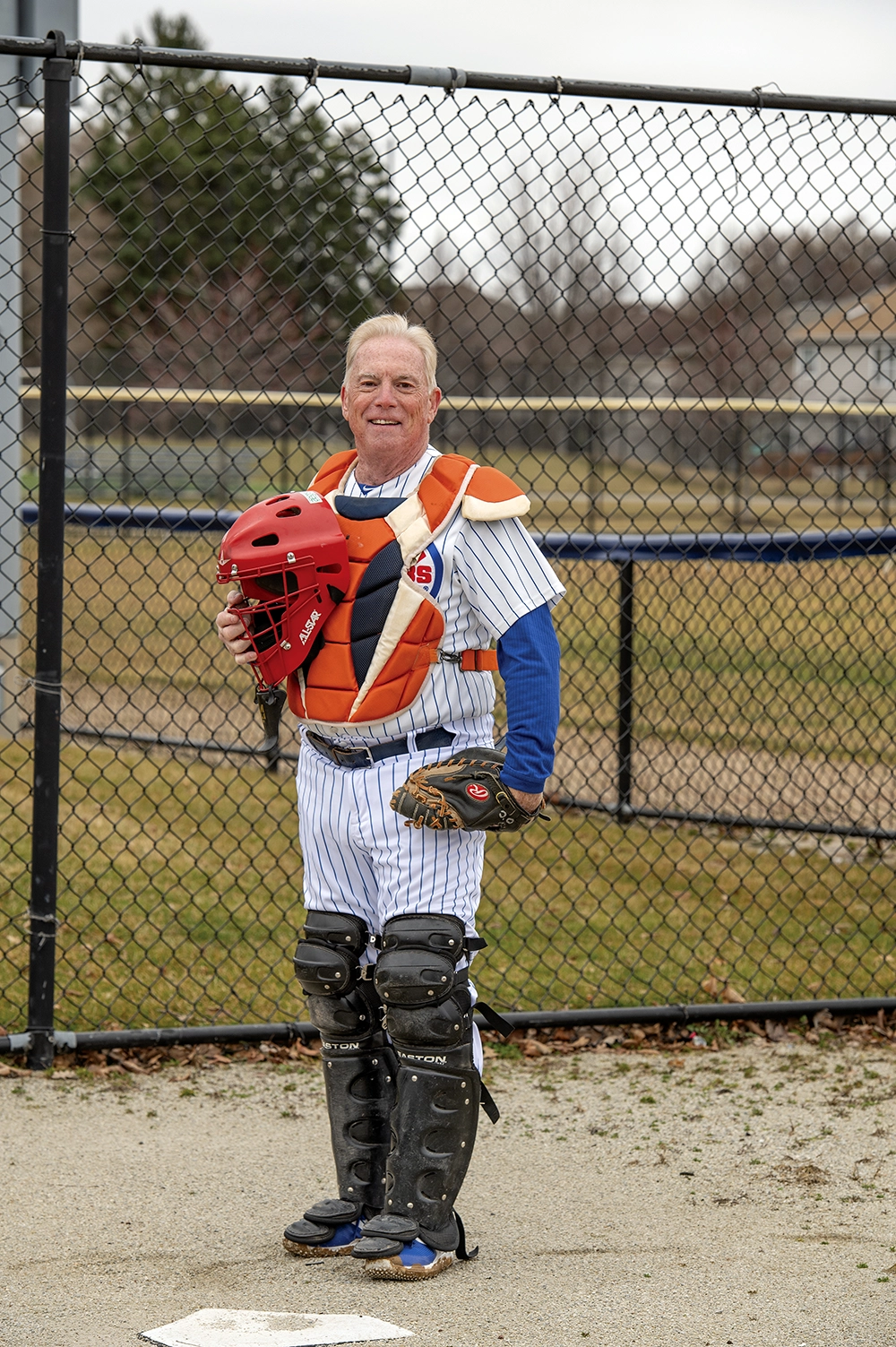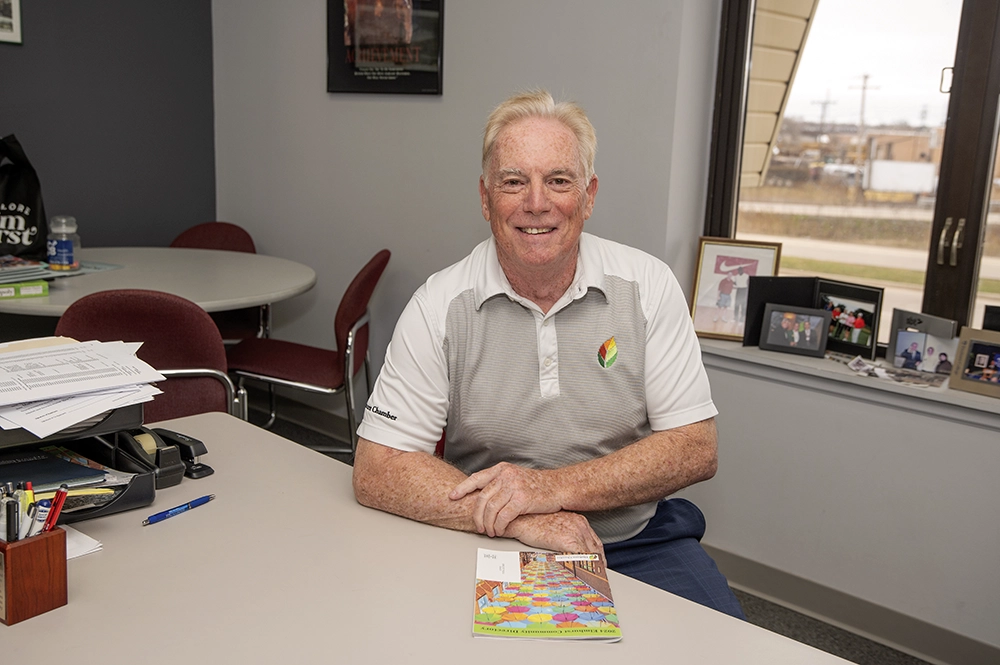John Quigley: Lifelong Elmhurst Resident & Chamber of Commerce President

John Quigley Captains Elmhurst Chamber of Commerce and his Senior Baseball Team
By Maureen Callahan | Photos by Laura Meyer

Quigley plans to retire from the Chamber by the end of 2025, but mentioned no plans of retiring from baseball.
John Quigley knows sports. He plays three or four baseball games a week in the Chicago Central Men’s Senior Baseball League. Quigley has used the life lessons learned on the baseball diamond and hockey rink to build a solid career. With retirement on the not-so-distant radar, he reflects on 33 wonderful years with the Elmhurst Chamber of Commerce and the significance of baseball on a successful career.
How long have you lived in Elmhurst?
I was born, raised, and educated here. And I have worked here for most of my life. I attended kindergarten at Hawthorne School, then walked across the street to Immaculate Conception Parish School and then next door to Immaculate Conception High School. After that, I decided to “get away” for college, so I walked across Wilder Park to Elmhurst College. (Quigley chuckled).
So, in the span of one block, I went from kindergarten through college graduation. There aren’t a whole lot of people who can say that. I am proud to be one of them.
Can you describe the primary purpose of the Chamber of Commerce?
We are a membership organization that primarily promotes, markets, advertises, and advocates for the business members that belong. There are also ancillary benefits for the entire business community that come from the work we do.
How is the Elmhurst Chamber different from other town chambers?
We’re a large enough chamber that we are legislatively active. Not all chambers have the numbers to be able to do that. We take stances on municipal, township, county, state, and federal legislation that we think will positively or negatively impact our membership.
We also have a very solid internship program, for which we partner with Elmhurst University (EU). It was started by my predecessor, and it’s something we have worked hard at.
We’ve had business, finance, and marketing majors serve, many of whom have brought special skills to the Chamber. It has been very beneficial. A state job path program pays 60% of our interns’ salaries, with the remaining 40% coming from an EU endowment set up by one of our members. So, it’s a sustainable program.
How has Elmhurst changed over your lifetime?
My parents moved to Elmhurst in 1955, right before I was born. Back then, there was still farmland here. There was also a small airport at the north end of town. My brother’s girlfriend used to ride over to our house on a horse because her family had stables on their property.
It’s not quite like that anymore! In my observation, a town either develops and adapts, or it becomes stagnant. Often, I hear people say, “This is not the Elmhurst I grew up in.” No, it isn’t. And that’s a good thing!

John Quigley has been President & CEO of the Elmhurst Chamber of Commerce since 1999.
What is your favorite thing about Elmhurst?
That’s a tough question. It would be hard to pick one particular thing. I think the best part about Elmhurst is that you don’t have to leave town to get all the benefits of the big city. We bring speakers, rock concerts, and art exhibits to Elmhurst through a variety of venues.
We’re on a rail line if you want to go to Chicago, and there are many choices there, but there are many worthwhile things to do here, too. We have a hospital, great schools – both public and parochial – a history museum, an art museum, a fantastic library, and a wonderful park district. Everything is in this one community. You really cannot ask for more.
Tell us about your baseball career.
I have played baseball, on and off, my whole life. I played Elmhurst Little League and subsequent teams all the way through high school. I stepped back from baseball for a while to play softball. I played in one of the first 12-inch softball leagues when the sport was just starting out. My team won the softball world championship when I was 50. I did get back into baseball in my mid-forties when a friend asked me to fill in on his team one day.
I hadn’t hit a baseball since I was 18! After that first game back, I was hooked again. For several years, I played both sports simultaneously – a 12-inch softball game on Friday night, followed by a baseball game on Saturday morning. It required some focus to go back and forth between the two, as there are different rules. I’m retired from softball now, but I’m very active in men’s senior baseball leagues.
How has baseball affected your leadership style?
Whether you’re on a baseball team or running an organization, you need strong leadership that provides a direction toward which everybody can jump on board. In either case, you need good teammates. You can’t do it individually. I have played on some great teams.
Sometimes, I have been the best player, and other times, I have been one of many good players. Similarly, when you’re running a business organization, you really need a good board of directors, ambassadors, and volunteers. If you don’t have them, day-to-day operations become much more difficult. In either scenario, you need the proverbial heavy hitters!
Do you find much carryover between the Chamber and a baseball game?
Any sport can teach you great lessons if you’re willing to learn them. You learn about what you can and can’t do individually and how to deal with the bad as well as the good, because whether work or sports, you aren’t going to win them all.
I can be boisterous when playing sports. I am vociferous when I work at the Chamber. I do realize, however, the difference between speaking to both teams – whether in the Chamber or the dugout. Obviously, communication styles differ on the field, as opposed to a business situation.
How long do you plan to serve?
I’ve been here 33 years. I came in 1991, and I have been President & CEO since 1999. There are those who say I will never retire. (Quigley chuckled). I announced at our State of the City address in January that my intent is to be totally retired by the end of next year. I recently reiterated it at our awards banquet. When I was hired, my predecessor had died in office six months earlier, and the Chamber had been without a full-time CEO for 12 months.
I hope to have our Director of Member Services in a position to become the interim President & CEO for 2025. I want to be sure the transition goes smoothly, so I’ll still be present, doing some of the marketing and promotional things I do now, but my plan is to be gone by the end of 2025. But it will be hard. I’ve never had a job I haven’t loved. This is no exception! ■

Quigley remains active in men’s senior baseball leagues.
